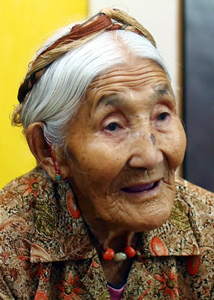Name: Khapochi Kalsang
(Alias: No)
Gender: Female
Interview Age: 84
Date of Birth: 1933
Birthplace: Tawo, Utsang, Tibet
Year Left Tibet: 1960
Profession: Farming
Monk/Nun: Previously
Political Prisoner: No

Interview No.: 9U
Date: 2017-04-05
Language: Tibetan
Location: Sakya Tibetan Settlement, Puruwala, Himachal Pradesh, India
Categories: Culture and History
Keywords: childhood memories, customs/traditions, escape experiences, farm life, herding, marriage practices, monastic life, taxes, thamzing/struggle sessions, Utsang
Summary:
Khapochi Kalsang was born in Tawo, an isolated village of around 4-5 families in Utsang Province. As a small child she spent her time grazing animals and later carried manure to the fields. Once each year the villagers had to travel 12 hours to the town of Sakya to pay their taxes. Meetings were held to determine the tax amount and a penalty was levied if one did not arrive on time. Khapochi Kalsang became a nun at age 17 or 18 as a form of tax that her family must pay. She was only required to spend one month at the nunnery each year saying prayers.
When she wanted to marry, Khapochi Kalsang's family had to pay a large fine to the nunnery. Her new husband was already married to her elder sister, who requested that she be a second bride because they needed help on the farm. She describes the common practice of two or three brothers sharing a wife or two sisters sharing a husband in order to have enough labor. She also explains how people dealt with situations of family discord, domestic violence and illegitimate children.
After the Chinese invasion, Khapochi Kalsang's husband was required to attend thamzing 'struggle sessions' and witnessed the executions of their local leaders. She recounts the arduous journey of two months trekking across the mountains in order to escape to India.
Interview Team:
- Marcella Adamski (Interviewer)
- Tenzin Yangchen (Interpreter)
- Tenzin Choenyi (Videographer)

